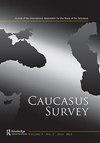Law and State Practice in Armenia: Dealing with the Issues Concerning the Search, Exhumation and Identification of Missing Persons in Conflict Zones
IF 0.4
Q3 AREA STUDIES
引用次数: 3
Abstract
This article deals with missing persons in Armenia. So far around 5,000 people from all sides in the Nagorno-Karabakh conflict have been reported as having gone missing. This article contextualises the democratic and human rights situation in Armenia and argues that if progress is to occur, there needs to be a coordinating mechanism involving all conflict parties to search, recover, and identify the missing. One sign of progress is that a new Commission – the Inter-Agency Commission on POWs, Hostages and Missing Persons – was established in Armenia in 2019, and a new decree adopted. However, it needs to be reformed to allow it to be better suited to achieve the necessary goals. The study examines the law on the missing and finds that there is much confusion about the legislation, as it is scattered and often vague and unclear. The laws are aimed at, and applicable to, criminal cases, and not the humanitarian nature of such instances. It therefore argues that a new law ought to be adopted. A variety of recommendations are made in the article such as the need to enhance information collection, to find potential burial sites, and to systematically map and protect possible burial sites to ensure that future recovery and identification processes are not hindered.亚美尼亚的法律和国家实践:处理冲突地区失踪人员的搜寻、发掘和身份确认问题
本文涉及亚美尼亚境内的失踪人员。到目前为止,据报道,纳戈尔诺-卡拉巴赫冲突各方约有5000人失踪。这篇文章结合亚美尼亚的民主和人权状况,认为如果要取得进展,就需要有一个协调机制,让所有冲突各方参与搜寻、找回和确认失踪人员。取得进展的一个迹象是,2019年在亚美尼亚成立了一个新的委员会——战俘、人质和失踪人员机构间委员会,并通过了一项新法令。然而,它需要进行改革,使其更适合实现必要的目标。这项研究审查了关于失踪人员的法律,发现立法存在很多混乱,因为它是分散的,而且往往是模糊和不清楚的。这些法律针对并适用于刑事案件,而不是此类案件的人道主义性质。因此,它认为应该通过一项新的法律。文章中提出了各种建议,例如需要加强信息收集,寻找潜在的埋葬地点,以及系统地绘制和保护可能的埋葬地点的地图,以确保未来的恢复和识别过程不受阻碍。
本文章由计算机程序翻译,如有差异,请以英文原文为准。
求助全文
约1分钟内获得全文
求助全文
来源期刊

Caucasus Survey
Arts and Humanities-History
CiteScore
1.30
自引率
9.10%
发文量
4
期刊介绍:
Caucasus Survey is a new peer-reviewed, multidisciplinary and independent journal, concerned with the study of the Caucasus – the independent republics of Armenia, Azerbaijan and Georgia, de facto entities in the area and the North Caucasian republics and regions of the Russian Federation. Also covered are issues relating to the Republic of Kalmykia, Crimea, the Cossacks, Nogays, and Caucasian diasporas. Caucasus Survey aims to advance an area studies tradition in the humanities and social sciences about and from the Caucasus, connecting this tradition with core disciplinary concerns in the fields of history, political science, sociology, anthropology, cultural and religious studies, economics, political geography and demography, security, war and peace studies, and social psychology. Research enhancing understanding of the region’s conflicts and relations between the Russian Federation and the Caucasus, internationally and domestically with regard to the North Caucasus, features high in our concerns.
 求助内容:
求助内容: 应助结果提醒方式:
应助结果提醒方式:


